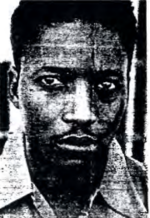 Augusta Chronicle, July 18, 1979 On April 28, 1946, Edward and Mary Bennett were shot to death in front of their young children in Aiken County, South Carolina, during the robbery of their grocery. As he lay dying, Edward Bennett stated, “a big negro shot me and robbed me.” The Aiken County police interrogated and released many suspects, but the investigation remained unsuccessful for two and one-half months. This violent murder had left the community terrified, and pressure was mounting for police to find the killer. L.D. Harris, a slight black man who drifted between odd jobs, became a suspect when it was learned that he had left town for Nashville, Tennessee, shortly after the murders and possessed a pistol. The Aiken County sheriff obtained a warrant, ostensibly in order to arrest Harris for the theft of his aunt’s pistol, but actually to secure his return from Nashville. Harris was taken into custody in Nashville, but the warrant was not read to him. He was informed of the charges against him only after being brought to Aiken County jail, and was never informed of his rights under South Carolina law. Harris initially believed he was being arrested because he owed a farmer about five dollars. Over the course of five days, multiple officers systematically questioned Harris in a small, stifling hot room. During the interrogations, a constable and an officer struck Harris in the face. During one period of questioning, a state officer shook a club at Harris and stated, “ …if you don't say you did kill those people, we will get a rope and rubber hose and you know what we will do.” Before Harris confessed, the sheriff threatened that his mother would be arrested if he did not confess. On the fifth night, Harris, who was illiterate, signed a confession stating that he had committed the Bennett murders. Three months later, in October 1946, Harris was indicted and arraigned without counsel, and imprisoned at the South Carolina State Penitentiary. In January 1947, Harris’s case went to trial. Harris testified that he had confessed because police officers refused to believe his claims of innocence, that the sheriff had dictated the confession, and that he had only repeated the sheriff’s words because the threats frightened him. The judge told the jury that without Harris’s confession, no evidence supported a conviction. The jury, finding the confession to be voluntary, sentenced Harris to the electric chair. Harris and his appointed attorneys, Leonard Williamson and Julian Salley, appealed the conviction. The Supreme Court of South Carolina affirmed Harris’s conviction and sentence of death by the electric chair, denying that the circumstances surrounding his confession precluded its admission under the Due Process Clause of the Constitution. With the help of Leonard Williamson and Julian Salley, Harris appealed to the Supreme Court of the United States. The United States Supreme Court, noting that Harris’s confession was the product of sustained pressure from the police, determined that his confession was involuntary. Further, the Court pointed out that Harris was illiterate, not informed of his rights under South Carolina law, and not given a preliminary hearing, and that his confession was deficient in that it did not contain the usual statement that he understood that his confession might be used against him. During the several days over which Harris was questioned, he had no access to friends or family and was surrounded by as many as a dozen officers and people in positions of authority. The systematic persistence of Harris’s questioning, the length of the periods of questioning, the failure to advise Harris of his rights, the absence of friends or disinterested persons, and the character of the defendant persuaded the United States Supreme Court that Harris’s confession was tainted, precluding its admission under the Due Process clause. In a 5-4 vote, the United States Supreme Court reversed the South Carolina Supreme Court’s sentence of death by electric chair on June 27, 1949. Following this reversal, it appears that Harris was released from prison (although some articles report that he was returned to prison for some period of time). Monroe “Blue” Hickson was picked up for questioning in 1946 when Aiken County police were initially investigating the Bennett murders, but was released after stating that he was walking to see his employer. At age 49, Hickson was paroled in 1957 after serving a sentence for burglary. Shortly thereafter, he bludgeoned an Aiken County shopkeeper and was returned to police custody. The attack was very similar to two other murders and one attempted murder that had occurred in the same time period as the Bennett murders. Hickson confessed to each of these 1946 crimes in Aiken County, including the Bennett murders, describing the locations, victims, and method of operation in detail. It is not clear whether Harris was still living at the time of the Hickson confession that finally cleared Harris for the Bennett murders. – Researched by Crystrina Coats
|